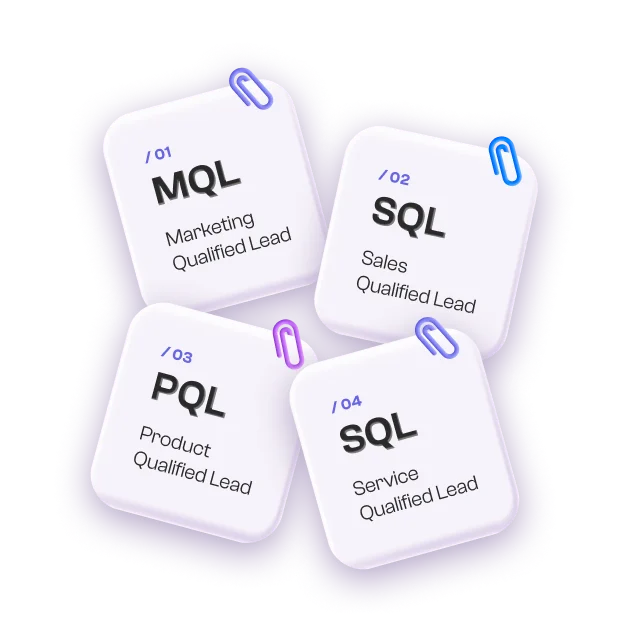Lead generation in digital marketing is an essential strategy that focuses on attracting and engaging potential customers to foster interest in a company’s products or services. This process is vital for building a reliable pipeline of prospects and is particularly crucial in the digital realm where interactions and transactions predominately occur online.
The goal is to convert strangers and prospects into leads by capturing their information through various digital channels, thereby initiating a potential sales process. Digital marketing offers a myriad of tools and platforms to facilitate this engagement, from social media and email marketing to SEO and content marketing. These tools enable businesses to reach a broader audience more effectively than traditional marketing methods.
By leveraging lead generation marketing strategies, companies can generate leads more efficiently, targeting users based on their online behavior, preferences, and demographics, which significantly increases the chances of conversion.
What Is A Lead?
In the context of digital marketing, a lead is defined as any individual who demonstrates interest in a company’s offerings through any form of engagement that can be tracked digitally. This engagement might include actions such as filling out a form to download a white paper, subscribing to a newsletter, or initiating contact through a chatbot on a website.
Unlike traditional methods of acquiring leads, which often involve purchasing lists of contacts, digital leads are generated through the potential customer’s voluntary interaction with the brand. This makes the leads more valuable, as they have already shown a level of interest in what the company has to offer.
The digital footprint left by a lead provides valuable insights into their interests and needs, allowing businesses to tailor their marketing efforts more effectively. As a result, the quality of leads generated through digital marketing is often higher, leading to improved conversion rates and a more efficient sales process.
Why Do You Need Leads?
Leads serve as the foundation for business growth in the digital age. They are essentially potential customers who have expressed an interest in your products or services, marking the first step in the journey from prospect to customer. The importance of generating leads lies in its direct impact on sales and revenue growth. Without a steady influx of leads, a business would struggle to expand its customer base and increase sales.
Furthermore, leads enable businesses to nurture relationships with potential customers through targeted communication and personalized marketing efforts. This nurturing process is crucial for converting leads into customers by providing them with the information and incentives they need to make a purchase decision. Effective lead generation and nurturing not only contribute to immediate sales but also help in building a loyal customer base, fostering repeat business, and generating positive word-of-mouth, which is invaluable for long-term success.
In today’s highly competitive digital marketplace, the ability to generate and nurture leads effectively can set a company apart from its competitors. It allows businesses to maintain a steady pipeline of potential customers, ensuring sustained growth and profitability.
The Two Main Areas Of Focus For Lead Generation
Now that you have an understanding of what is lead generation in marketing, let’s explore the two main areas of focus and primary segments: Business-to-Business (B2B) and Business-to-Consumer (B2C). Each segment targets a distinct audience, requiring tailored strategies to effectively attract and engage potential customers.
B2B Lead Generation
Lead generation in B2B marketing is a strategic process aimed at garnering the interest of potential business clients. This segment is characterized by its complex sales cycles, which are typically lengthier and involve a series of decision-makers. The intricacy of B2B transactions necessitates a robust approach to lead nurturing, as building a rapport with potential clients is crucial to navigating the extended decision-making process.
Effective B2B marketing lead generation strategies might include the development of specialized content that addresses specific industry pain points, participation in trade shows, and the use of targeted LinkedIn marketing campaigns. The objective is to establish credibility and trust, positioning the company as a thought leader in its domain.
B2C Lead Generation
Conversely, B2C lead generation targets individual consumers, focusing on strategies that captivate and convert personal interest into sales. B2C interactions are generally more straightforward, with shorter sales cycles and decisions typically made by individuals rather than committees.
This segment benefits from a more direct approach to lead generation in marketing, leveraging emotional and impulse buying triggers through platforms like social media, search engine marketing, and influencer partnerships. The goal is to create engaging, relatable content that resonates with the consumer’s desires and needs, prompting immediate action.
Using Digital Marketing For Lead Nurturing
Lead nurturing transcends the initial act of generating interest, focusing on the development of ongoing relationships with potential clients at every stage of the sales funnel. This process is crucial for maintaining engagement with leads who are not yet ready to make a purchase. Digital marketing plays a pivotal role in lead nurturing through personalized email campaigns, targeted content marketing, and custom offers designed to keep the brand at the forefront of the lead’s mind.
By providing valuable content and solutions tailored to the lead’s interests and stage in the buying journey, businesses can effectively guide them closer to a purchasing decision, enhancing the likelihood of conversion.
What Are The Different Types of Leads?
Understanding the various types of leads is vital for tailoring an engaging lead generation marketing plan to effectively convert potential customers.
Marketing Qualified Leads (MQLs)
MQLs are individuals who have shown interest in what a brand has to offer through engagement with marketing efforts but are not yet ready to enter the sales process. Such engagements could include interactions like downloading educational content or participating in online webinars. MQLs require targeted nurturing efforts to move them further down the sales funnel, turning interest into genuine purchase intent.
Sales Qualified Leads (SQLs)
SQLs represent a more advanced stage in the lead generation process. These are leads who have taken actions that explicitly indicate a readiness to consider a purchase, such as directly inquiring about a product or service. SQLs are closer to making a buying decision and thus warrant direct sales engagement, where personalized communication can address specific needs and objections, facilitating the conversion from lead to customer.
Service Qualified Leads
These leads emerge from interactions with the company’s service or support teams, indicating a willingness to upgrade or expand their existing relationship with the company. Such leads are already customers but have expressed interest in additional offerings, making them prime candidates for upselling or cross-selling strategies.
Product Qualified Leads (PQLs)
PQLs are users who have experienced a company’s product or service, typically through a free trial or a freemium model, and have taken actions that signify a readiness to transition to a paid offering. This direct experience with the product allows for a more informed and convincing sales approach, leveraging the user’s familiarity with the product’s benefits to encourage a purchase.
The Aims of Lead Generation in Digital Marketing
A lead generation marketing strategy is aimed at constructing a robust pipeline of potential customers. The overarching objective is to captivate leads through various digital channels, secure their contact details, and foster a relationship until they are primed for a purchase decision.
This multifaceted process involves a series of strategic steps, starting from the initial attraction phase through various marketing efforts, to conversion into prospects, and ultimately nurturing these potential customers through targeted engagement. The end goal is not just to make a single sale but to cultivate a long-term relationship that benefits both the customer and the company in the long run.
Digital marketing lead generation transcends traditional marketing boundaries, leveraging technology and online platforms to reach a wider yet more targeted audience. The digital landscape offers unprecedented opportunities for businesses to connect with potential customers across the globe, tailoring their messages and offers to match the specific needs and preferences of their target market.
By effectively generating leads, businesses can ensure a continuous flow of potential customers into their sales funnel, increasing the likelihood of conversions and, subsequently, sales.
Different Types of Lead Generation Marketing
The digital era has ushered in a variety of lead generation tactics, each with its unique advantages and applications. Here’s a deeper dive into some of the most effective lead generation digital marketing strategies:
Writing Content
Content marketing has emerged as a powerful tool for attracting leads, offering value through insightful and engaging content that resonates with the target audience. This marketing lead generation strategy encompasses a range of formats, from blog posts and articles to ebooks, white papers, and infographics.
The key is to deliver content that not only addresses the queries and challenges faced by your audience but also positions your brand as an authority in your field. High-quality content can attract organic traffic to your website, encouraging visitors to engage further with your brand.
Email Marketing
Email marketing stands as one of the most direct and personal ways to nurture leads and guide them through the buying journey. By crafting personalized and relevant email campaigns, businesses can maintain a dialogue with potential customers, providing them with valuable information, exclusive offers, and updates that keep the brand top of mind. This strategy requires a delicate balance of providing value without overwhelming the recipient, aiming to build trust and engagement over time.
Paid Ads / Remarketing
Paid advertising and remarketing represent a fast-track approach to reaching a broad audience and re-engaging those who have previously interacted with your brand. Platforms such as Google AdWords and various social media channels enable businesses to display targeted ads to users based on their search behavior, interests, and past interactions with the website.
Remarketing, in particular, focuses on reaching individuals who have already shown interest in your products or services, making them more likely to convert into leads and, eventually, customers.
Social Media Marketing
Social media platforms are invaluable for engaging with potential leads in a more informal and interactive environment. By publishing compelling content, participating in conversations, and running targeted advertising campaigns, businesses can increase their visibility and attract followers who are interested in their offerings. Social media also provides an excellent opportunity to build a community around your brand, fostering loyalty and encouraging word-of-mouth promotion.
Why is Lead Generation in Digital Marketing So Important?
Lead generation enables businesses to stand out, attract more website traffic, and convert that traffic into sales. With the right lead generation tactics, companies can not only reach their target audience more effectively but also increase their conversion rates, driving growth and profitability.
How Can You Get Started with Lead Generation for Your Business?
Embarking on lead generation for your business is a multifaceted process that requires a strategic approach to identify and engage your target audience effectively. This journey begins with a deep understanding of who your potential customers are, their needs, interests, and online behaviors. By crafting content that resonates with them and utilizing digital tools to capture their information, businesses can cultivate a pipeline of prospects eager to learn more about their offerings.
Identifying Your Target Audience
The first step in successful lead generation is to identify and understand your target audience. This involves researching your ideal customers to gain insights into their demographics, preferences, challenges, and online activities. Armed with this knowledge, you can tailor your online marketing lead generation and strategies to align with their interests, increasing the likelihood of engagement.
Engaging Content Creation
Content is the cornerstone of digital lead generation, serving as the primary tool to attract and engage potential digital marketing leads. Creating compelling, valuable content that addresses the specific needs and questions of your target audience can draw them to your website.
This content can take various forms, including informative blog posts, in-depth ebooks, insightful white papers, and engaging videos. By providing solutions or valuable information through your content, you establish your brand as a trusted resource in your industry.
Lead Capture Mechanisms
With engaging content in place, the next step is to implement mechanisms on your website to capture the contact information of interested visitors. Forms, landing pages, and call-to-action (CTA) buttons are essential tools for converting website traffic into leads.
These elements should be designed with user experience in mind, ensuring they are both inviting and straightforward to use. Offering something of value, such as a free ebook or a webinar signup, in exchange for their information can significantly increase conversion rates.
Driving Traffic to Your Digital Assets
Having set the stage with valuable content and lead capture mechanisms, the focus shifts to driving targeted traffic to these assets. This can be achieved through a combination of SEO strategies to improve organic search visibility, social media marketing to engage with your audience on platforms they frequent, and paid advertising to reach a broader audience quickly. Each of these channels requires a tailored approach to effectively attract and direct potential leads to your website.
Frequent Content Is a Must
Consistency in content creation and distribution is vital for keeping your audience engaged and establishing your brand’s authority in your sector. Regularly publishing high-quality content not only helps in attracting new leads but also in keeping your existing audience interested and engaged with your brand.
Organic Lead Generation
Organic lead generation is about attracting leads through non-paid efforts such as SEO, content marketing, and social media engagement. This approach is highly effective in building a sustainable pipeline of high-quality leads over time. By optimizing your content for search engines and engaging with your audience on social media, you can increase your brand’s visibility and attract leads naturally.
Having The Right Tools
Effective lead generation relies heavily on the use of appropriate digital tools. This includes CRM systems to organize and manage lead information, email marketing software to automate and personalize communication, and analytics tools to track and measure the performance of your lead generation efforts. The right set of tools can streamline processes, enhance efficiency, and provide insights to refine your strategies continually.
Conclusion
Lead generation online marketing is pivotal for business growth and success in today’s digital landscape. By understanding the nuances of generating and nurturing leads, companies can cultivate a thriving sales pipeline, driving business growth. The journey of lead generation involves a blend of strategic audience targeting, content creation, and the effective use of digital tools and platforms.
As the digital realm evolves, so must your lead generation strategies, adapting to new trends and technologies to ensure your efforts yield the desired outcomes. With a focused approach and continuous optimization, your lead generation endeavors can propel your business forward, securing its position in the competitive digital marketplace.



